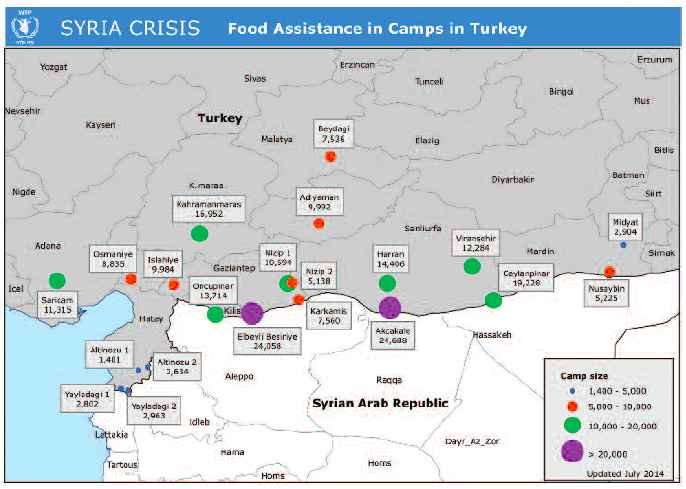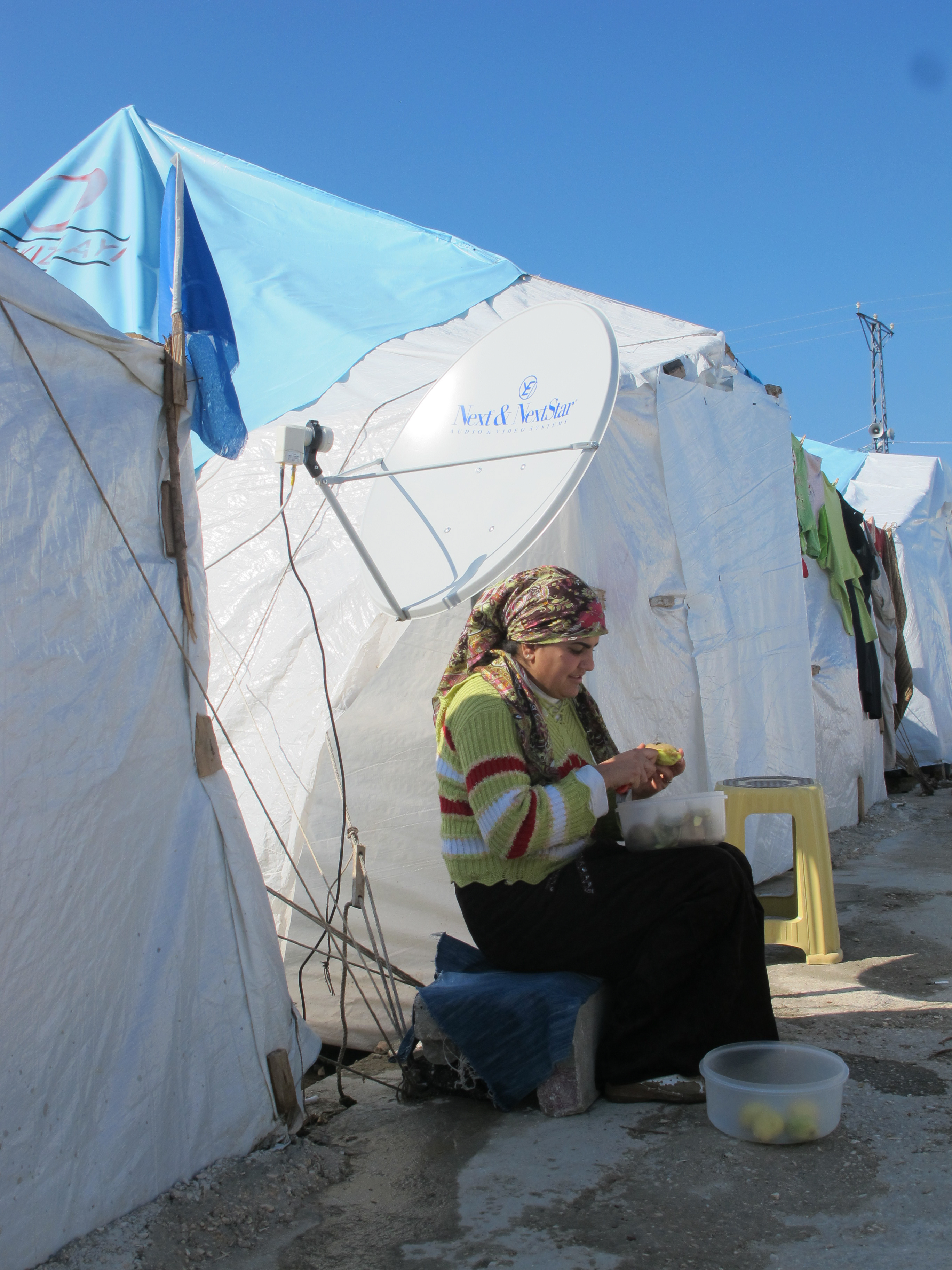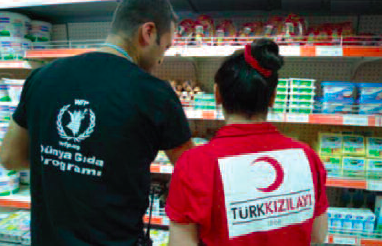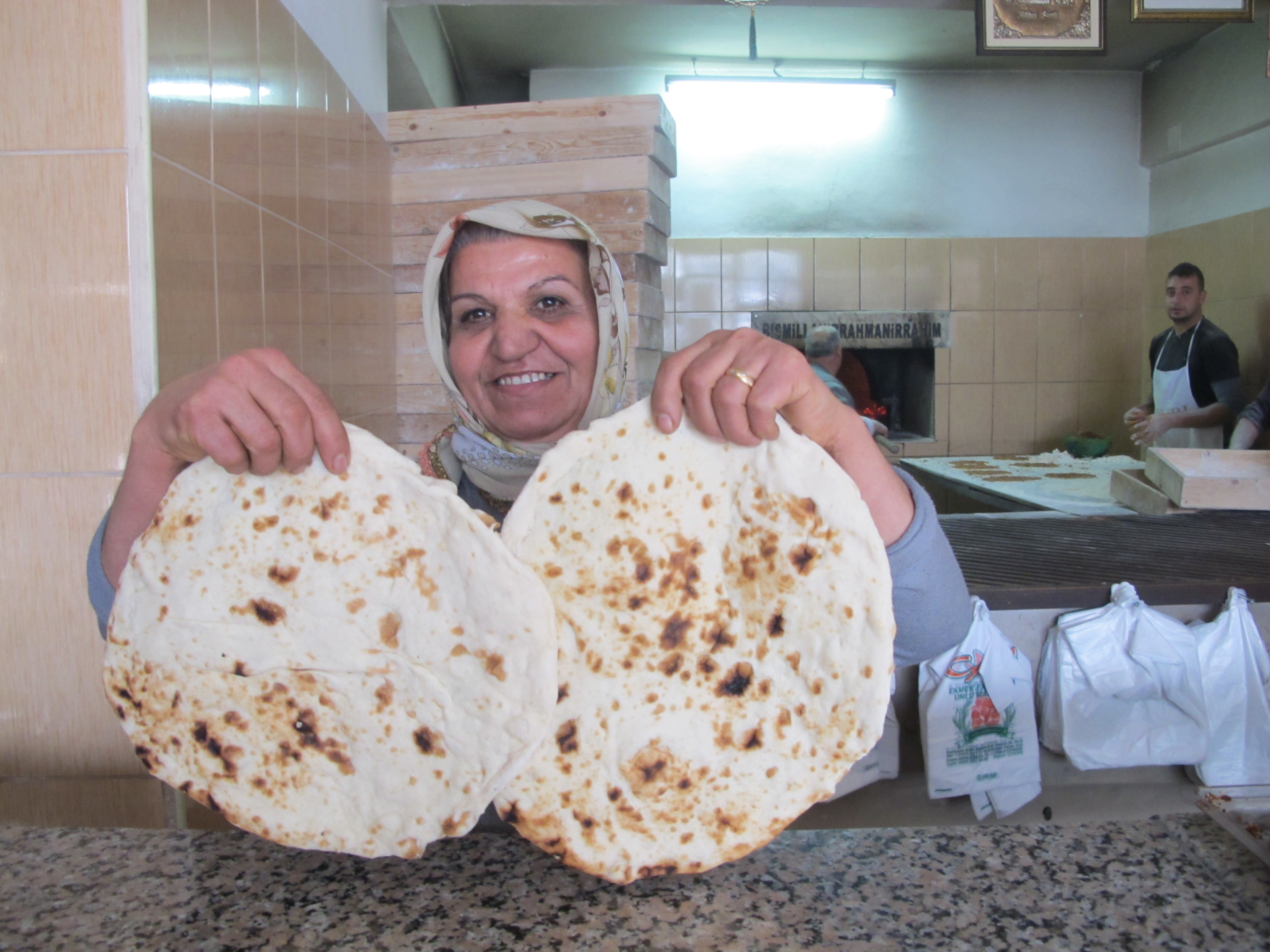Experiences of the e-Food card programme in the Turkish refugee camps
 By Kathleen Inglis and Jennifer Vargas
By Kathleen Inglis and Jennifer Vargas
Kathleen Inglis currently works with the WFP as the Programme Communications Officer. She has worked in humanitarian aid in various capacities from communications to logistics and information management in protracted emergencies including Sudan, Ethiopia, Afghanistan, Pakistan and DRC.
Jennifer Vargas currently works with the WFP in Turkey as the Information Management/Reports Officer. She has studied the region and refugee crises extensively and this marks her first foray into the humanitarian community.
Overview
 The Government of Turkey has generally maintained an open-border policy with Syria since the first Syrian refugees began crossing the border in April 2011. Three years later, Turkey hosts more than 900,000 Syrian ‘guests’ - 220,000 live in 22 camps and approximately 700,000 in urban centres. These estimates are considered conservative as registration continues and by the end of 2014, the Government expects the total number of Syrians refugees will reach 1.5 million. Prominent news sources, such as the New York Times, Reuters-Huffington Post, have expressed concerns about the livelihood of Syrians residing outside of camps; food security, shelter and education were among the most basic unmet necessities mentioned. Thus far, provision of food assistance to off camp populations is limited to small scale interventions within non-governmental organisations’ (NGOs) area of operations. In the coming months, WFP plans to offer technical assistance to the Government to conduct a needs assessment and develop an appropriate modality for the sustainable provision of food assistance to most vulnerable populations outside of camps.
The Government of Turkey has generally maintained an open-border policy with Syria since the first Syrian refugees began crossing the border in April 2011. Three years later, Turkey hosts more than 900,000 Syrian ‘guests’ - 220,000 live in 22 camps and approximately 700,000 in urban centres. These estimates are considered conservative as registration continues and by the end of 2014, the Government expects the total number of Syrians refugees will reach 1.5 million. Prominent news sources, such as the New York Times, Reuters-Huffington Post, have expressed concerns about the livelihood of Syrians residing outside of camps; food security, shelter and education were among the most basic unmet necessities mentioned. Thus far, provision of food assistance to off camp populations is limited to small scale interventions within non-governmental organisations’ (NGOs) area of operations. In the coming months, WFP plans to offer technical assistance to the Government to conduct a needs assessment and develop an appropriate modality for the sustainable provision of food assistance to most vulnerable populations outside of camps.

 The international community has often lauded the Turkish Government for its generous response to the crisis. The Government of Turkey estimates that its provision of aid has surpassed US$3.5 billion, while the international community has thus far provided some US$150 million in assistance for Syrian refugees in Turkey. The camps, moreover, have received considerable recognition for the quality of shelter and service provision for the refugees. The Prime Ministry’s Disaster and Emergency Management Presidency (AFAD) is responsible for the management of all camps across ten governorates. The World Food Programme (WFP), in partnership with the Turkish Red Crescent (TRC, known as KIZILAY), has worked extensively with AFAD to provide food assistance to all civilian camp populations.
The international community has often lauded the Turkish Government for its generous response to the crisis. The Government of Turkey estimates that its provision of aid has surpassed US$3.5 billion, while the international community has thus far provided some US$150 million in assistance for Syrian refugees in Turkey. The camps, moreover, have received considerable recognition for the quality of shelter and service provision for the refugees. The Prime Ministry’s Disaster and Emergency Management Presidency (AFAD) is responsible for the management of all camps across ten governorates. The World Food Programme (WFP), in partnership with the Turkish Red Crescent (TRC, known as KIZILAY), has worked extensively with AFAD to provide food assistance to all civilian camp populations.
Electronic food card programme: how it works
The WFP/KIZILAY Electronic Food (e-Food) Card Programme was officially launched in October 2012 to provide food assistance to 12,000 beneficiaries in Kilis camp. The programme was envisioned as an efficient and innovative way of supporting families in camps to purchase diverse and nutritious food items of their own choosing with an e-card. The total amount of assistance for the household is electronically loaded onto the e-Food Card in two separate instalments per month. At the end of the month, the balance remaining on the card, if any, is cleared and returned to the WFP/KIZILAY e-Food Card Programme account. An updated list of family members still residing in the camp is provided by AFAD on a monthly basis and the amount uploaded to the card for the month is adjusted accordingly. To use the card, the persons undertaking the shopping must present their camp ID card at participating markets and the container or tent number/family number must match that printed on the e-Food Card. The e-Food Card only works in the terminals of shops selected by WFP, KIZILAY and the Government; this allows for oversight and monitoring, ensuring that sufficient quantities of various nutritious and fresh food products are available for purchase by households at competitive market prices. The entitlement can be redeemed in camp shops or shops located in nearby urban centres. All shops are under contract with KIZILAY and monitored to ensure compliance with programme regulations and highest standards of quality.
Moving from in-kind food assistance to a market-based approach
Prior to the introduction of the WFP/KIZILAY e-Food Card Programme, the government authorities were the sole entities responsible for providing food assistance and the modality varied from camp to camp. In the last week of July 2012 (when WFP and AFAD conducted the initial voucher feasibility assessment), half of the registered population (43,679) received daily cooked meals and the other half received parcels of dry food every two weeks and fresh food on a weekly basis. The composition of meals and food parcels was highly diversified and often exceeded the internationally agreed standards on daily dietary intake of 2,100 kilocalories, which is sufficient to meet the nutritional needs of disaster affected populations. As an example, the daily caloric content of cooked meals in one of the camps in Hatay ranged between 3,000 and 5,000 kilocalories per person per day and the content of dry and fresh food parcels ranged between 26 to 45 items. Likewise, the cost of assistance greatly differed across the camps, with the monthly cost for cooked meals ranging from US$147 to US$170 per person. These figures reflect the generous and first-rate response by the Government and local authorities, while at the same time raise questions regarding the sustainability of the services provided. At the time, it was expected that Syrians would return to their respective homes within a reasonable period of time. More than three years after the onset of the crisis that shows no signs of abating, demands, duration and scale of programming have increased, as well as the need for innovative and effective responses.
By April 2012, as the crisis continued to worsen and unanticipated numbers of Syrians kept crossing over the border, the Government of Turkey agreed to a ‘burden-sharing’ proposal with the international community. In August 2012, at the behest of the Turkish Government, WFP met with AFAD to discuss the possibility of providing complementary food assistance using voucher-based transfers, an approach recommended by WFP’s voucher feasibility study. This proposal was well received by the government and was included in the United Nations Regional Response Plan. In consultation with AFAD, the Deputy Directorate General for International Political Organisations within the Ministry of Foreign Affairs and KIZILAY, it was agreed to implement a gradual strategy to transition from in-kind food assistance to a market-based approach with the provision of vouchers.
Finding the best solution based on context
Within the context of Turkey, that of a middle-income, emerging market economy with strong national capacity and pre-existing emergency-response mechanisms, the role of international organisations shifted from solely providing humanitarian assistance (monetary or otherwise) to providing innovative programming that works in conjunction with existing national resources and capabilities. The launch of the WFP/KIZILAY e-Food Card Programme in Turkey was the first instance of an electronic voucher system being used at the outset of an emergency response. Simply put, it was the right tool, at the right time, in the right place and was only possible because of existing infrastructure and context:
- Interactions between international organisations, non-governmental organisations (NGOs), and the Government of Turkey were more synergistic than would normally take place in less developed nations; the government supported and facilitated the programme and transition process.
- AFAD-established and managed camps and provided beneficiaries with cooking facilities, electricity and commercial food markets located within the camps.
- The agriculture and the commercial food-sector in Turkey is strong: the country is among the world's leading producers of agricultural products and Turkey has been self-sufficient in food production since the 1980s.
- The electronic banking system in-country is established and robust.
- The use of vouchers both as a national welfare and safety-net mechanisms for vulnerable Turkish populations, and by commercial entities providing meals for employees, existed in Turkey prior to the Syrian crisis.
- KIZILAY’s 150 years of experience in emergency response offered WFP a reputable and highly capable partner with a field presence in all of the camps. (KIZILAY is the largest humanitarian organisation in Turkey and is part of the International Red Cross and Red Crescent Movement. The organisation was founded under the Ottoman Empire on 11 June, 1868).
- Donors recognised the added value of the tri-partite partnership between WFP, KIZILAY and AFAD, which enabled significant contributions to be channelled through a UN agency to ease the burden of the Syrian crisis response on the Turkish Government and people.
The comparative advantage of the WFP/KIZILAY programme rests in the level of expertise both WFP offers in e-voucher programming and KIZILAY offers in emergency response, in Turkey and abroad. WFP’s vast experience with cash and voucher programmes (C&V) and food security ensures that standard operating procedures were established at the onset of the Syrian response in Turkey, which facilitated programme transparency, beneficiary participation and donor confidence. KIZILAY had a wealth of experience in emergency and development work at home and abroad.
For instance, KIZILAY had developed its electronic card in mid-2012 for a pilot programme to assist social vulnerable groups in Turkey, which made it the tool of choice. It was further adapted and used in the e-food Card Programme, thereby greatly reducing lead time required for establishing agreements with financial institutions and designing and testing the practical functioning of a market based welfare system.
 First home-cooked meal since arriving in Turkey: Nazari household
First home-cooked meal since arriving in Turkey: Nazari household
On the first day of launching the e-Food Card Programme in Nizip II camp in April, 2013, WFP staff spoke with the Nazari household to learn what the family’s first fresh cooked meal would be since fleeing their home in Syria several months before. The father was preparing a Syrian dish, “Sinyat Khidhar”, made from fresh eggplant, tomatoes and onions with a mix of spices to serve to his mother, his wife (who had recently given birth in the camp) and their three young children. He told WFP staff, “I enjoy making the food for my family with my own hands. The children can taste the things we used to eat in our homeland thanks to the e-Food Card Programme.” Families enjoy the social norms of shopping and cooking for themselves and the camp managers have reported less food waste compared to the days of hot meal provision, as well as less stress for camp staff and the beneficiary families. The e-Food Card has also encouraged gardening and establishment of bread-baking facilities where infrastructure and resources permit.
Merits of the market based approach
The programme has proven highly successful in terms of beneficiary satisfaction, effective use of limited resources and investment in the local economy. Over 90 percent of interviewed beneficiaries prefer the e-Food Card to hot meal provision. With regard to efficiency, the programme allows for over 70 percent savings when compared to the provision of hot meals, also eliminating food waste that inevitably occurs at distributions. The programme directly impacts local communities as beneficiaries use the entirety of their food entitlement at shops that are owned, managed and supplied by local retailers. AFAD was responsible for the establishment of commercial markets located inside camps. However, in the Hatay region where camps are located close to urban centres, WFP and KIZILAY identified, assessed and contracted existing commercial food markets located outside of camps to participate in the programme.
The e-Food Card Programme served as a model for WFP’s rollout of electronic vouchers in Jordan and Lebanon and for the AFAD card which is operational in all camps in Turkey.
Step by step expansion
By July 2013, the programme had rapidly expanded to cover 115,000 beneficiaries living in camps in ten provinces. At this stage, owing to WFP funding constraints, expansion plans were arrested and the programme capped to serving only fourteen of the 22 existing camps. Each beneficiary received 80 Turkish liras per month (approximately US$40) loaded onto their family’s e-Food Card that could be used in participating markets. AFAD continued to deliver food assistance in the eight remaining camps not covered by WFP and KIZILAY, either through provision of hot meals or in late 2013, through the newly launched AFAD E-Card programme – based on the WFP/KIZILAY programme model – that was also being utilised in some camps.
In response to the primary challenge of inadequate funding which constrained programme expansion throughout 2013, the Government of Turkey proposed to WFP a cost-sharing arrangement for the provision of the food ration for Syrians in all camps. Here, the WFP/KIZILAY contribution to food assistance would reduce from 80 to 60 Turkish liras (US$30) and AFAD would supplement this with an amount of 20 Turkish liras (US$10) per beneficiary per month onto the AFAD e-Card for food purchases and 5TL for non-food items also complemented by in-kind donations. By June, 2014, this tripartite arrangement has been implemented in all 21 camps where the Government requested WFP assistance, accounting for food security to over 217,000 beneficiaries in 45,000 households, who shop at a total of 58 shops. The monthly transfer to beneficiaries is US$6.6 million which is directly spent in markets and, therefore, directly invested into the local economy.
Monitoring and evaluation activities
 WFP has a robust monitoring and evaluation (M&E) and reporting programme in place; field monitoring staff (FMS) work in coordination with KIZILAY field staff to ensure markets have a wide variety of quality products for sale at market-value prices in hygienic and secure locations. Monitoring tools include: a post distribution monitoring questionnaire (PDM) to be applied at the household level, an onsite monitoring checklist (OSM) to be filled by monitors when visiting participating shops, and a beneficiary contact monitoring questionnaire (BCM) applied to beneficiaries coming out of these shops. Additionally, Price Market Monitoring (PMM) is conducted on a monthly basis in the contracted shops where e-Food Card Programme beneficiaries redeem their e-vouchers, as well as in non-participating city shops.
WFP has a robust monitoring and evaluation (M&E) and reporting programme in place; field monitoring staff (FMS) work in coordination with KIZILAY field staff to ensure markets have a wide variety of quality products for sale at market-value prices in hygienic and secure locations. Monitoring tools include: a post distribution monitoring questionnaire (PDM) to be applied at the household level, an onsite monitoring checklist (OSM) to be filled by monitors when visiting participating shops, and a beneficiary contact monitoring questionnaire (BCM) applied to beneficiaries coming out of these shops. Additionally, Price Market Monitoring (PMM) is conducted on a monthly basis in the contracted shops where e-Food Card Programme beneficiaries redeem their e-vouchers, as well as in non-participating city shops.
WFP monitoring findings indicate that the majority of programme beneficiaries have been living in camps for a relatively long period: 51 percent arrived over a year ago, another 42 percent arrived 7 to 12 months ago, and recent arrivals (less than 6 months) only represent 7 percent of the total in-camp population. The average size of a household is six members. Beneficiary heads of households in Turkey are, in 90 percent of cases, married and ten percent are single or widowed. Thirty-five percent of households are headed by females while only seven percent of households are headed by the elderly. Most of the interviewed families have children under five years of age and interviews revealed that for every working-age person who has the physical possibility of generating income, there are two dependents, which demonstrates a high level of socio-economic vulnerability.
Despite the constant monitoring activities of WFP and KIZILAY, and in almost all camps by market monitoring committees, high prices in contracted shops continue to pose challenges. WFP and KIZILAY monitors continue to advocate with all stakeholders for fair market prices in all participating markets. Rampant drought has been one contributing factor to price increases. Turkey has been dealing with a drought that began at the end of 2013 and is causing major difficulties for agricultural producers. The drought, in conjunction with high temperatures, has severely decreased the yield of various nuts, fruits, vegetables and grains. The wheat harvest has decreased by at least 21 percent from 2013 and Turkey will be required to import wheat to meet demand. Economists predict that the drought will continue to raise the prices of food and keep affecting consumers throughout 2014. The drought has decreased water reserves and affected energy production, thus increasing the price of electricity throughout the country as well. Other compounding factors include fluctuations in the value of the Turkish lira, decreased food supply as well as the creation of monopolies in camps with very few participating shops. As a response to the monopoly issue in particular, WFP and KIZILAY with the encouragement of AFAD are now actively looking to contract more shops outside the camps to foster greater market competition and to encourage the provision of high quality commodities and services at lower prices to beneficiaries. Beneficiaries generally attain high levels of dietary diversity; they can purchase basic items for the nutritious diet established in the food basket. The high cost of infant formula, however, has been a continuing challenge, compounded by the fact that a large majority of mothers do not breastfeed past six months.
Sustainability of operation – funding and shortfalls
Looking forward, the mid-year review of the Regional Response Plan 6 (July- December 2014) stipulates that around 250,000-300,000 people will need food assistance in the next six months and WFP will require US$58 million. Currently, WFP Turkey reaches 225,000 people per month and requires US$8 million to do so; the operation faces a pipeline break approximately every six weeks. WFP is funded entirely by voluntary contributions and remains vigilant and engaged with donors in order to secure the funds.
Emmanuel Safari – staff profile
WFP is the largest humanitarian agency in the world and as such, draws personnel and expertise from all corners of the globe. The first Cash &Voucher programme officer sent to Gaziantep in south-eastern Turkey is a tall man from Rwanda named Emmanuel Safari. Emmanuel has extensive experience with the implementation of C&V programming in many countries including in Rwanda, Haiti, Egypt, Tunisia, Lebanon and Mali. Inquisitive residents of Gaziantep constantly stopped this unusual and friendly visitor to exchange a few words with him and, when bold, to request a photo with him! Safari’s first impressions of the government assistance to its Syrian guests were about how much was being done and the incredible hospitality and generosity of the Turkish people.
For more information, contact: Kathleen Inglis, email: kathleen.inglis@wfp.org and Jennifer Vargas, email: jennifer.vargas@wfp.org

